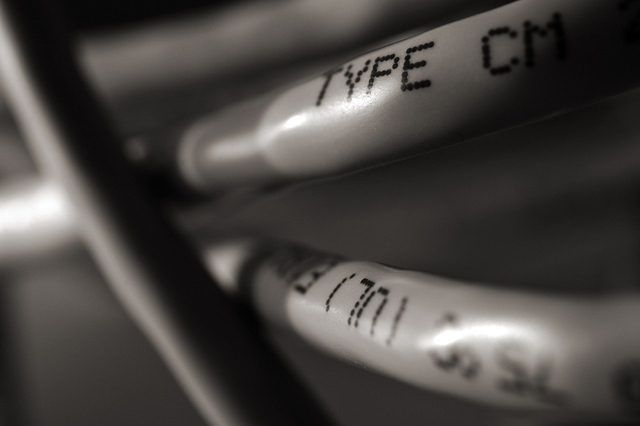
The great subscriber access war between Level 3 and Comcast has receded into the background, but Level 3 has plenty of other business before the Federal Communications Commission. Here's an issue that got our attention. The net communications facilities provider wants the FCC to do something about what it calls "demand lock-up" contracts forced upon the company in exchange for high speed data interconnection contracts with Verizon, AT&T, and CenturyLink.
These deals, as described by the filing, require purchasers of "special access" services from the incumbent telcos to buy from 85 percent to all of the amount of data connectivity they bought in the previous year to get desirable price discounts on the "rack rates" the big telcos offer.
Companies like Level 3 "begrudgingly agree" to these lock-up arrangements, the firm charges, because "it is uneconomic to refuse them when competitors receive substantial price breaks for agreeing to such terms." And of course the incumbents in question dominate many parts of the United States where no other carrier is available.
"Where lock-up contracts are in place, competition is stifled," Level 3 attorneys say, and have asked the FCC to impose a series of remedies on the situation, most notably precluding these Local Exchange Carriers from:
offering, directly or indirectly, in any new contract tariff or tariff discount plan: i) a discount, rebate or any other form of price concession, or ii) any other commercial term(s) or condition(s) in exchange for a customer's commitment to purchase more than 50% of the amount spent on special access services in the previous year.
The Level 3 empire
This plea sheds light on the extent of Level 3's complex involvement in Internet services. Every Level 3 watcher knows that the company signed on to do video data transmission for Netflix, then wound up in a huge fight with Comcast, accusing the cable of giant of jacking up access charges to its subscribers. Comcast insists that the fight is really just a peering/transit disagreement, in which two huge data carriers disagree about the general terms for network interconnection.
The issue is by no means resolved. Level 3 has agreed to Comcast's terms "under protest," the company's latest Security and Exchange Commission statement says. "Our dispute with Comcast has not yet been resolved" and, "at present, we cannot predict the outcome of these IP interconnection disputes."
But Level 3 is also a big provider in the voice services, web conferencing, and enterprise system connecting, qualifying it as a "Competitive Local Exchange Carrier"—CLEC in FCC jargon. As of the last day of 2011, the outfit ran about 26,000 CLEC busy route miles of metropolitan fiber networks across North America, 3,100 across Europe, and 1,600 through Latin America.
And it's worth taking a glance at the Level 3 empire, all told. Here is an accounting of the company's global network facilities directly from the SEC filing:
- approximately 100,000 intercity route miles in North America, Europe and Latin America;
- metropolitan fiber networks in approximately 170 markets containing approximately 30,000 route miles;
- approximately eight million square feet of Gateway and transmission facilities in North America, Europe and Latin America;
- approximately 350 colocation and data center facilities globally;
- approximately 35,000 route miles of subsea optical fiber cable systems; and
more than 45 countries in service around the world.
That's a lot of transmission lines, but still less than the big incumbent telcos. Since the FCC doesn't require the big telco and cable ISPs to lease out their lines at wholesale prices, CLECs like Level 3 buy voice/data interconnection from the incumbents at their "special access" rates. For over a decade, the regulation of these prices has been a source of huge regulatory combat—pitting Verizon and AT&T against smaller carriers Sprint, T-Mobile, Clearwire, and cbeyond, all of which belong to the No Chokepoints Coalition.
Back in the late 1990s, the Commission began deregulating the rates on the assumption that the dot-com boom of the era would encourage a huge buildout of capacity lines. But the boom went bust. Undaunted, the big teclos lobbied for the continued deregulation of the price caps associated with those rates—which is why, in the special access debate, AT&T and Verizon are referred to as "price cap incumbents."
By 2007, special access represented nearly 25 percent of Verizon's, and close to a fifth of AT&T's income, according to a study released in 2009 by the National Association of Regulatory Utility Commissioners (NARUC).
No predictions from here
We asked for answers to Level 3's concerns from Verizon and AT&T.
"What Level 3's filing fails to appreciate," responded Verizon's Ed McFadden, "is that Verizon offers many types of special access plans with a variety of terms and conditions that offer significant discounts to all customers. Customers have the option of selecting the plan that best suit their business needs. These plans exist because of the robust competition in special-access services, and we will continue to provide the FCC with the data it needs to evaluate this marketplace."
AT&T hasn't specifically responded to Level 3 in the FCC's special access proceeding, but questions anti-competitive claims and faults most of the smaller telcos for allegedly failing to provide the Commission the data that it has asked for to make a decision on the problem.
As for Level 3, the company has asked the FCC to freeze special access rates until it makes a determination on the issue, something the agency has put off doing for over half a decade.
"The FCC is reviewing the voluminous record in this proceeding, and we cannot predict when or if FCC will issue a comprehensive ruling in this rulemaking," Level 3's SEC report observes. The company has, as noted here, also told the Commission that "certain tariff terms" of the carriers are "unjust and unreasonable, particularly given their market power."
"We likewise cannot predict if or when such agencies may act on such matters," Level 3's discussion of the issue concludes.
Listing image by Photograph by be.mosaic
reader comments
17